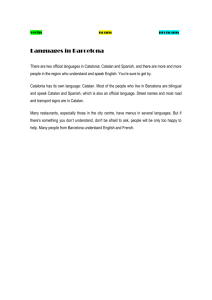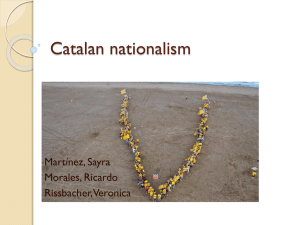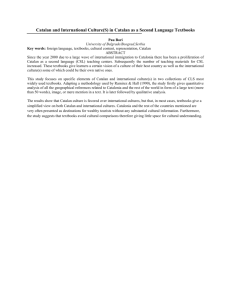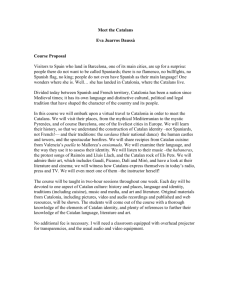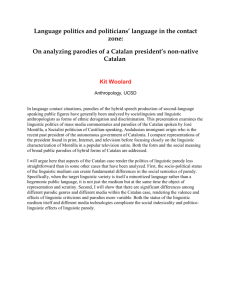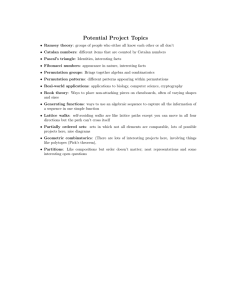One Nation, One (Common) Language?
advertisement
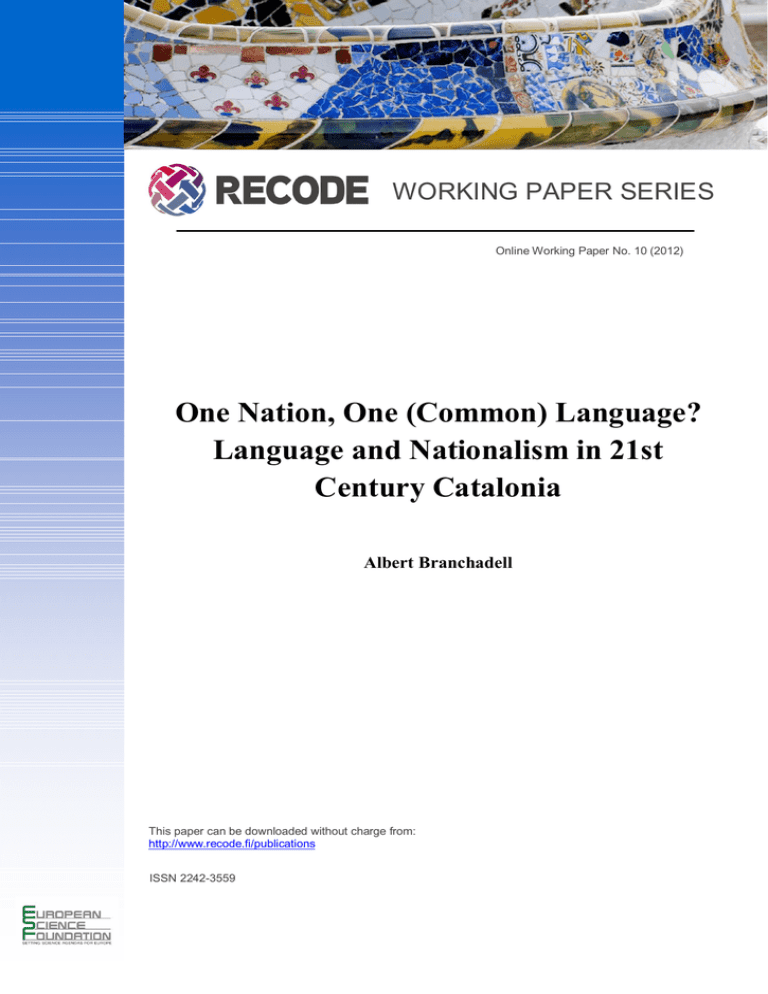
WORKING PAPER SERIES Online Working Paper No. 10 (2012) One Nation, One (Common) Language? Language and Nationalism in 21st Century Catalonia Albert Branchadell This paper can be downloaded without charge from: http://www.recode.fi/publications ISSN 2242-3559 RECODE – Responding to Complex Diversity in Europe and Canada ONLINE WORKING PAPER SERIES RECODE, a research networking programme financed through the European Science Foundation (ESF), is intended to explore to what extent the processes of transnationalisation, migration, religious mobilisation and cultural differentiation entail a new configuration of social conflict in post-industrial societies - a possible new constellation labelled complex diversity. RECODE brings together scholars from across Europe and Canada in a series of scientific activities. More information about the programme and the working papers series is available via the RECODE websites: www.recode.fi www.esf.org/recode Series Editor: Peter A. Kraus Editorial Assistant: Daniel Moran Section 1, Workshop 1: Linguistic Diversity and the Changing Dynamics of Political Integration Title: One Nation, One (Common) Language? Language and Nationalism in 21st Century Catalonia Author: Albert Branchadell Working Paper No. 10 Publication Date of this Version: October 2012 Webpage: http://www.recode.fi/publications © RECODE, 2012 Helsinki, Finland http://www.recode.fi © 2012 by Albert Branchadell All rights reserved. Short sections of text, not to exceed two paragraphs, may be quoted without explicit permission provided that full credit is given to the source. The views expressed in this paper do not necessarily reflect those of the RECODE Research Networking Programme or the European Science Foundation. Albert Branchadell School of Translation and Interpretation, Autonomous University of Barcelona Albert.Branchadell@uab.cat ISSN 2242-3559 Standing Committee for the Social Sciences (SCSS) Standing Committee for the Humanities (SCH) One Nation, One (Common) Language? Language and Nationalism in 21st Century Catalonia Albert Branchadell Albert Branchadell (b. 1964 in Barcelona), has a Ph.D. in Linguistics (Autonomous University of Barcelona) and a Ph.D. in Political Science (Pompeu Fabra University). He works at the crossroads of sociolinguistics, political theory and translation studies. His political science thesis, a comparative normative study of the language policies of Quebec and Catalonia, was published under the title La moralitat de la política lingüística (The morality of language policy). He is co-editor of Less Translated Languages (John Benjamins, 2005), where less translated languages are posited as a new field of inquiry, and has been a referee for prestigious journals both in translation studies (Meta, Quaderns, Translation Studies), sociolinguistics (Journal of Multilingual and Multicultural Development) and political science (Nations and Nationalism). He is currently a professor at the School of Translation and Interpretation (Autonomous University of Barcelona). Abstract This paper describes a recent shift in the language ideology that underlies (Catalan) language promotion efforts in Catalonia and considers its relevance for normative reflection on language and nationalism. Catalonia is first presented as the (mostly) bilingual setting it is, where the predominant language is Spanish not Catalan. The ideological shift is then described whereby Catalan nationalist elites are struggling to de-ethnicize Catalan and make it the public common language of Catalonia. In view of Catalonia’s linguistic duality, this intended shift raises an important normative problem. To overcome it, the nationalist approach is contested with a call for a post-nationalist management of linguistic plurality. The underlying theme of this paper is how political community is to be achieved in a linguistically divided polity. At least in the 2004–2010 tenure, Catalan political elites adhered to the old nationalist view that one common language is a condition for political integration. Catalonia as a (mainly) bilingual setting This paper will take the linguistic reality of present-day Catalonia into account. It is important to emphasize it because this reality is not always acknowledged (if it is known at all). Too often Spain is treated as a multilingual (multinational) polity made out of discrete, linguistically (nationally) homogeneous units, Catalonia among them. Take the works of Will Kymlicka, to name just one prominent scholar. In Politics in the Vernacular (2001), for instance, it is always taken for granted that “the Catalans” en bloc are a national minority, without regard to the internal linguistic (national) divisions of Catalan society. In Patten & Kymlicka (2003), a contribution entirely focused on language issues, Catalonia is put on a par with Dutch-speaking Flanders, French-speaking Quebec, French- and Italianspeaking cantons of Switzerland or German-speaking South Tyrol. This is a token of a general problem that we will encounter later on; as De Schutter (2008: 110) emphasized, “Kymlicka [wrongly] presents a view of the world as a transparent mosaic of cultural and linguistic blocs, where clear and stable boundaries mark off monolingual national groups”. RECODE Online Working Paper No. 10 October 2012 ISSN: 2242-3559 Albert Branchadell 2 Now, the fact is that Catalonia is not Catalan-speaking in the way these other settings are Dutch-speaking and so on. According to all sorts of available surveys, much less than half of the Catalan population can be considered to be “Catalan-speaking”. The Enquesta d’Usos Lingüístics de la Població (2008) makes a triple distinction between “initial language” (the language one learned first), “language of identification” (the language one identifies with), and “usual language” (the language one uses most often). As can be seen in table 1, in all three accounts Spanish not Catalan happens to be Catalonia’s predominant language. Table 1 Catalan Spanish Both Initial language 31.6 55.0 3.8 Own language 37.2 46.5 8.8 Usual language 35.6 45.9 12.0 Source: Enquesta d’Usos Lingüístics de la Població (2008) The most recent survey to date, the “Baròmetre de la Comunicació i la Cultura” (2010), resorts to the same triple distinction and provides similar data, as can be seen in table 2 (Please notice that in this survey the answer “both” was not permitted). Table 2 Catalan Spanish Both Initial language 35.3 56.7 -- Own language 39.4 55.1 -- Usual language 39.5 56.2 -- Source: Baròmetre de la Comunicació i la Cultura (2010) These data are in sharp contrast to the ones of the mentioned territories, in which the titular language is amply predominant. According to the Canadian census of population (2006), the population of French mother tongue in Quebec is 79.6 per cent. The population of French as the language spoken most often at home is 81.8 per cent. According to the Swiss census of population (2000), in French-speaking territories of Switzerland French is the main language (Hauptsprache) of 81.6 per cent of the population. Figures oscillate between 75.8 (Geneva) and 90 per cent (Jura). In the Italianspeaking canton of Ticino Italian is the main language of 83.1 per cent of the population. According to the Südtiroler Sprachbarometer (2004), 73.1 per cent of the population considers German to be their mother tongue (22.4 opts for Italian, and 3.8 for Ladin). With 80.5 per cent German is also the language spoken most often at work. As for Dutch-speaking Flanders, there are no recent census language data. If we leave Brussels and its metropolitan area aside (we will get back to it later on), it is clear that Dutch is the predominant language of Flanders. If we were to spot settings that truly resemble Catalonia in terms of their linguistic structure, we should leave all the above cases aside and turn our attention to places that present a more balanced linguistic duality. In Canada, New Brunswick and not Quebec could perhaps be a case in point. In Europe, Ukraine would certainly be a good candidate. According to the Ukrainian census (2001), Ukrainian is the native language ( ) of 67.5 per cent of the population, and Russian ranks second with a 29.6 per cent. At first sight, this seems to come close to the South Tyrolean situation. But as Hrytsenko (2008: 200) notices “the declared ‘native language’ is often not indicative of the language a person usually speaks, but rather of his/her ethnic/national conscience”. Now, if the question is not RECODE Online Working Paper No. 10 October 2012 ISSN: 2242-3559 One Nation, One (Common) Language? Language and Nationalism in 21st Century Catalonia 3 about a linguistically misleading a category like “native language”, Russian gets very close to and even surpasses Ukrainian. In two surveys held in 2002 and 2003 respondents were asked to name the language (Russian or Ukrainian) that they speak more easily. Both in 2002 and in 2003 Russian ranked ahead Ukrainian. The question about the language spoken most often gave the striking results in table 3. Table 3 Ukrainian Russian Hard to say, probably the same ( , ) 2002 13.8 26.9 59.3 2003 23.5 37.1 39.4 Source: Khmelko, table 4 If the option is left out, it becomes clear that behind the census data lies a slight predominance of Russian over Ukrainian, as can be seen in table 4. Table 4 Ukrainian Russian 2002 46.6 53.4 2003 47.2 52.8 Source: Khmelko, table 6 The shift De Schutter and Boyden (2008) have developed a framework for the interpretation of various normative theories on language policy that relates them to two clashes of language ideologies. This is a very stimulating endeavor, but also a token of a problem that undermines most analyses of language policy done by political theorists, namely, their relative ignorance of neighboring disciplines where research is conducted that is relevant to the study of language policy. In this particular case it is quite obvious that De Schutter and Boyden incur the “reinventing the wheel” syndrome that they warn the reader against. Among the ignored references of a paper entitled “The Ethics of Language Planning” is Cobarrubias’ pioneering paper “Ethical Issues in [Language] Status Planning”. But the major shortcoming of their specific approach lies in their inability to draw on the selfstanding field of language ideology that started to grow in the last decade of the 20th century, with landmarks like Language Ideologies: Practice and Theory (1998) or Language Ideological Debates (1999). Prominent scholars in the field like Jan Blommaert and Kathryn Woolard have simply no place in their reference section. In any case, De Schutter and Boyden (2008) is a good starting point for political theory-minded scholars to grasp what is going on in Catalonia in terms of the language ideology that underlies Catalan language promotion efforts (moreover, De Schutter has explicitly dwelt on the Catalan case in his works). The first clash that De Schutter and Boyden (2008) identify is one between “constitutivism” and “instrumentalism” (in this paper we will leave the second clash aside, although the interplay between “discreteness” and “hybridity” is also very relevant for the Catalan case). According to De Schutter and Boyden the constitutive view says that “language constitutes who I am, that my language and my identity are inextricably intertwined, and that language allows me to express things or ideas that I could not express otherwise”. By contrast, the instrumentalist view defends “the idea that languages should be RECODE Online Working Paper No. 10 October 2012 ISSN: 2242-3559 Albert Branchadell 4 seen primarily as tools to perform nonlinguistically defined things”. In a contemporary analysis of the Ukrainian language situation, Kulyk (2005) spoke in terms of “identification” and “understanding”. The first “stresses the role/value of language as an important marker of group identity […] and presupposes/prescribes a one-to-one correspondence between nations and their eponymous languages”, whereas the second “sees language primarily as a conduit for conveying information and thus prescribes the use of a language that is best understood for all participants in a given communication act”. Now, the fact is that the pair constitutivism / instrumentalism closely resembles the one set forth by Kathryn Woolard, a leading linguistic anthropologist who ranks among the scholars that opened up language ideology as a field of inquiry. In a seminal paper by herself and Susan Gal (Gal & Wolaard 1995), a distinction was first introduced between anonymity and authenticity as two sources of linguistic authority in modern Western societies. Later on this distinction was explored in a monograph (Gal & Woolard 2001) and Woolard turned it into a kind of personal concern (Woolard 2005, 2007, 2008a, 2008b). According to Woolard (2008b), “the ideology of authenticity locates the value of a language in its relationship to a particular community. That which is authentic is viewed as the genuine expression of such a community, or of an essential Self”. Underneath this ideological complex lies the Herderian concept of language (language as the genius of a people) that has experienced wide-spread success in Western Europe and beyond (Blommaert and Verschueren 1991, 1998). In contrast to this, anonymity locates the value of a language in its (alleged) universality. If German Romanticism is behind authenticity, French Republicanism (or its American imitation) underlies anonymity. A small correction is in order here: Woolard (2008b:16f) equates “Herderian” with “nationalist”, but “French republican” is no less nationalist (in the relevant sense of the term). According to Blommaert and Verschueren (1991, 1998) both German and French traditions illustrate the dogma of “homogeneism”, a view of society in which differences are seen as dangerous and centrifugal and thus have to be eliminated. Now, what is interesting for us is that Woolard uses the concepts of authenticity and anonymity to discuss the position of Catalan in relation to Spanish. The keyword for Catalan language policies in the last decades of the 20th century was “own language” (llengua pròpia). According to Woolard (2008b: 13), “ethnic authenticity and identity value” contributed to the survival of Catalan under conditions of subordination. But now this value is in conflict with the universalistic ideology of anonymity that typically characterizes hegemonic public languages. The problem is not only that Catalan language policies are attacked for its alleged promotion of particularism (Lodares 2000, 2002), but also that authenticity can actually “constrain the acquisition and use of Catalan as a second language by a larger population”. Woolard reminds us that in her previous research (1989) she argued that “the indexical value of the Catalan language as a self-conscious badge for identifying ‘authentic Catalans’ […] hampered its acquisition as a second language for many young people. Those who could not make good on such an identity claim, or who refused it as a betrayal of another identity, were reluctant to use Catalan”. According to her, “Catalan would have to loosen its tie to an ascriptive ethnic identity if it was to become a successful public language”. Another scholar that has dealt with Catalonia’s “authenticity crisis” is sociolinguist Joan Pujolar (2004a, 2004b). Following Heller (1999), Pujolar claims that “in modern times, many linguistic minorities have been able to face the political identity of states presenting some alternative identities based on the same assumptions: language, authenticity, common specific features”. But now “the ideological foundations of linguistic nationalisms of the modern era are in crisis”. So linguistic minorities have been sort of stranded with a discourse that is not suitable for the new conditions. Specific to the Catalan case is the diffusion of Spanish: “Until the late twentieth century, Catalonia […] was constituted from a hegemonic identity defined primarily on the basis of the Catalan language, which gave the newcomers who adopted it a kind of social charter of citizenship. RECODE Online Working Paper No. 10 October 2012 ISSN: 2242-3559 One Nation, One (Common) Language? Language and Nationalism in 21st Century Catalonia 5 Today, although the language remains a very important symbolic attribute (no mistake), it is obvious that the linguistic-identity map has been dispersed with the introduction of Spanish in many areas and social sectors. So we have a discourse that does not know what role to give to broad sectors of the population who do use Catalan, but not in the way that the common sense of traditional Catalanism hoped or believed was a sign of Catalanity” (Pujolar 2004a: 13). When did Catalan start to loosen its tie to an ascriptive ethnic identity? In a famous lecture on the significance of the Catalan language for the Catalan nation former Catalan regional president Jordi Pujol was still speaking in an authenticity frame (Pujol 1995): I think that for Catalonia the language, the Catalan language, is a basic element of our identity, of our being as a people. I said some time, using the formula of a Basque philologist, that Catalan is the nerve of our nation. Two years after (1997), prominent members of the nationalist intelligentsia promoted a manifesto that called for radical legislative changes to make Catalan the only official language of Catalonia. Short of these changes, these supporters claimed that there was room for a new Language Act to make Catalan the “common language in all public uses”. This manifesto had little success, and no reference to Catalan as a common language was included in the new Language Act. But little by little the concept made its way.1 The turning point came probably around 2003. The last right-wing nationalist Catalan regional government headed by Jordi Pujol launched a campaign, “You are a teacher” (Tu ets mestre), which was aimed at making Catalan the everyday language in the interactions of locals with immigrants. Catalan was thus first explicitly called to overflow the ethnic boundaries of the Catalan-speaking group in order to become the common public language of Catalan society (“la langue parlée entre citoyens de langues maternelles différentes”, to put it in Quebecois terms). From 2004 on, the new left-wing nationalist Catalan regional government fully adopted this view. Woolard (2008a, 2008b) suggests that in the campaign “Wind Catalan Up” (Dóna corda al català), launched in 2005, “we may have a first glimpse of a developing shift in the rhetorical grounding of the defense of Catalan” (Woolard 2008b: 17). Woolard believes that this campaign was a move “from both authenticity and anonymity” (our italics), but more careful analysis shows that it was just a shift from authenticity to anonymity. The campaign certainly attributed to the Catalan language properties that are typical of anonymous, public languages: “Speak without shame”, “Speak freely”, “To start, speak Catalan”. The next campaign, “Spread Catalan” (Encomana el català) (2009–2010), went deeper into the same logic. In the ad of this campaign we see a foreign-looking young man entering a bakery in Barcelona. Overlooking the implicit norm of addressing foreigners in Spanish (the real common public language of Catalonia), the baker uses Catalan to ask the young man what he needs; the young man replies in Catalan, much to the baker’s satisfaction. Back in the street, the foreign-looking Catalan-speaking young man leads a choir where everybody (even three unlikely Bollywood dancers) sings in Catalan. The message is clear: Catalan is called to be “la langue parlée entre citoyens de langues maternelles différentes”. 1 Bridging the Atlantic is an easy task here, for the notion of “common public language” is of Quebecois origin, although its ultimate source lies in the French republican tradition. In the Énoncé de politique en matière d'immigration et d'intégration [1990: 16] we read: “Depuis le début de la révolution tranquille, l'action en matière linguistique des gouvernements qui se sont succédé au Québec se fonde sur le principe suivant : faire du français la langue commune de la vie publique grâce à laquelle les Québécois de toutes origines pourront communiquer entre eux et participer au développement de la société québécoise” (Since the beginning of the Quiet Revolution, the action on language affairs of successive governments in Quebec is based on the following principle: to make French the common language of public life through which Quebecers of all origins will be able to communicate among themselves and participate in the development of Quebec society). RECODE Online Working Paper No. 10 October 2012 ISSN: 2242-3559 Albert Branchadell 6 That the 2005 campaign was not a move from anonymity can be seen in the writings of the political leaders that were in charge of language policy between 2004 and 2010. In Balanç de política lingüística 2004–2010, Bernat Joan, Secretary of Language Policy from 2007 to 2010, overtly stated: The Secretariat of Language Policy of the Government of Catalonia works primarily to ensure that Catalan [...] is a language of full use within its own territory, and becomes the common public language of Catalonia, as a fundamental factor for ensuring the country’s social cohesion. This is clearly a copy and paste exercise from Quebec sources: “La société québécoise est une société plurielle. Et le français, langue officielle et commune, est un élément déterminant de sa cohésion sociale” (Commission 2001: 4). What does “common public language” mean? In a 2007 lecture, Bernat Joan’s boss, former Catalan regional vice-president Josep-Lluís Carod-Rovira, implicitly reflected on the shift to anonymity and gave some hint as to what a common public language is. According to him, Catalan should not be the language of Catalan nationalists but rather the language of all Catalans: A language that identifies itself only with a few, with a part of a whole, is not well positioned to become the language of all. Put more clearly, Catalan has to stop being [...] the language of catalanists to be the language of the Catalans. Of all without exception. As it is Italian in Rome, French in Paris or Spanish in Madrid, settings where it is not possible to detect the slightest ideological connotation in the users of these languages, because of the simple fact that they use these languages in all fields, always. In case it was not clear what “to be the language of all Catalans” meant, Carod-Rovira went on: Catalan must cease to be a political language to become the national language, a common meeting place for everyone, regardless of the private language of personal use everyone has […].We can greatly expand the number of users of the language if we turn all Catalans into Catalanspeakers and these ones into people who use the language in all domains of use without exception. In Catalonia, that is where the theory of the common public language finally leads to. A language (available) for everybody is forcibly turned into everybody’s language. Despite the copy and paste technique (“a common meeting place for everyone” is derived from “l’espace public commun où chacun peut rencontrer l’autre”), notice that the above statement places Catalan language policy well beyond its Quebec sources of inspiration: no one in Quebec would seriously pretend to turn all Quebecois (including “la communauté québécoise d’expression anglaise”) into French-speakers who use French in all settings without exception. The (not so) hidden agenda of the common public language advocates in Catalonia bears the name of societal monolingualism. The problem(s) This shift towards anonymity raises a number of problems. First, the shift can damage language maintenance. As has already been pointed out for Quebec (Oakes & Warren 2006, Fleischer 2007), de-ethnicization of a minority language can be a backfiring shot. We could RECODE Online Working Paper No. 10 October 2012 ISSN: 2242-3559 One Nation, One (Common) Language? Language and Nationalism in 21st Century Catalonia 7 raise this to the category of paradox: in the relevant settings language maintenance calls for de-ethnicization, but too much de-ethnicization undermines the traditional motivation for language maintenance. Second, to make a minority language anonymous can be a hopeless endeavor when this minority language shares its political space with another language of higher instrumental value. One authentic language and one anonymous language can manage to coexist, but two anonymous languages in one polity is a contradiction in terms. In sociolinguistic terms, Reversing Language Shift is a complex task but success is not impossible (Fishman, 1991); Replacing Common Public Language (our neologism) is almost out of reach with liberal-democratic means. But even if this shift towards anonymity did not backfire and were feasible in purely objective terms, it would raise an important normative problem. As De Schutter and Boyden (2008: 13f.) say, if the world were made out of discrete monolingual unities (which is Kymlicka’s approach to the matter), “a normative monolingual polities theory would not be inappropriate”. According to them, “the guideline to make the language of a territory the only publicly supported one in that territory typically proceeds on the assumption that there is one language in that territory and that linguistic and territorial boundaries coincide. However, such convergence is more an exception than the rule”. As we said at the outset, the assumption that there is one language in Catalonia and that linguistic and territorial boundaries coincide in this case is false. Hence, maintaining a homogeneist motto in a context such as Catalonia can and does result in injustice. To understand why this results in injustice, we can turn to what De Schutter (2008: 105) termed the “linguistic justice debate”, and more specifically to debate on the Linguistic Territoriality Principle vehemently advocated by Philippe Van Parijs and other scholars (Of course, this is not the right place to develop a full theory of linguistic justice. It will suffice to get a glimpse of the normative problems that the LTP runs into in a specific bilingual setting such as Catalonia). In De Schutter’s words, the LTP stipulates that “languages and territories are coterminous, such that each territory contains one language and/or has institutions operating only in that language” (read “each territory contains one common language”). In the words of Van Parijs (2000b), the LTP amounts to telling newcomers: “Whatever your mother tongue, you are welcome to settle here. But if you do, you will have to learn the local language, which will be the exclusive language of public administration, of political communication and most importantly of publicly subsidised education”. But what if in a given territory there is more than one local language? Van Parijs, the champion of the LTP, made a telling warning: “For this solution to work smoothly […] one obviously requires a significant degree of pre-existing linguistic homogeneity”. Now, De Schutter (2008) discredits the LTP in precisely those settings that lack the required linguistic homogeneity. According to him, in such settings a concern for linguistic identity should lead us to reject the LTP. If it is true that most people value their own language as an importance source of identity, in cases where there is no neat coincidence between languages and territories, implementing the LTP “would require infringing upon the identity” of speakers of languages other than the one favored by the LTP. The LTP could also be dismissed on more prosaic grounds. As with many other political theorists (not the case of Van Parijs, by the way), De Schutter does not seem to be aware of the works by Jonathan Pool, who did extremely important pioneering work in the study of language regimes in the last quarter of the 20th century. Pool (1990) noticed an apparent tendency of democratic political regimes to produce pluralistic language regimes and tried to model this tendency. One of the assumptions of his model was that people prefer their mother language to be official rather than not, in view of the “official benefit” they derive from it. In terms of De Schutter, one could say that implementing the LTP in a bilingual setting would infringe upon the preferences of speakers of the language not favored by the LTP. Of course, this subtle critique leads straightforwardly to a much more obvious one: implementing the LTP in a RECODE Online Working Paper No. 10 October 2012 ISSN: 2242-3559 Albert Branchadell 8 bilingual setting without people’s consent would not be simply unjust but also undemocratic. In other words, in the face of Catalonia’s deep-seated linguistic duality, the new motto “one nation, one common language” raises the same kind of normative problem as the traditional “one nation, one language”. What is going on here is a well-known phenomenon: in the words of Woolard (1998), “movements to save minority languages ironically are often structured, willy-nilly, around the same received notions of language that have led to their oppression and/or suppression”. The Catalan shift towards instrumentalism anonymity does not avoid the nationalist bind by which minority language advocates adopt the very nationalist frame (the one-to-one nation–language correspondence) they are supposed to contest. In this connection, it is striking to notice that the term “common language” is precisely the one that Spanish nationalists picked up in their 2008 campaign for Castilian (“Manifiesto por la lengua común”). The way out This paper will end up by exploring a way out of this bind. In his analysis of the “authenticity crisis”, Pujolar (2004a: 13) concluded that “a reformulation of Catalan language nationalism” is called for. And he connected this change with a well-known dichotomy in the theory of nationalism: Such changes have been characterized in some specialized debates as the passage from an ethnic nationalism to a civic nationalism [...]. Certainly, we could say that Catalan nationalism is in a transition phase between the construction of a community based on cultural traits towards a culturally diverse community defined in terms of social and political participation. Again, this is a Quebec-inspired reflection. In Comission (2001: 5) we read: “L’héritage civique a remplacé pour toujours l’héritage ethnique”. The paradox is that the civic stance is no less homogeneist than the ethnic one. In the name of social cohesion Spanish-speaking Catalans are expected to speak Catalan instead of Spanish. Instead of going back and forth along a nationalist continuum, we should rather override the authenticity–anonymity debate and embrace a post-nationalist stance in which the one-to-one nation–language correspondence is no longer taken for granted. Pujolar himself (2007: 90f) announced that “a post-national linguistic order is emerging” in which sociolinguistics as a discipline played a pivotal role in the production “of post-national discourses where bilingualism, code-switching, code-mixing, borrowing or linguistic interference’ are seen as productive strategies of expression and not as deviant practices”. In a similar vein, Woolard (2008a: 195) raised the same issue in the form of a question and professed her optimism: Can you get a new linguistic order? One that is not based on an ideology of authenticity, nor on a false claim of anonymity, but on some other kind of language awareness? Maybe a linguistic order that assumes difference and variability as basic communicative processes? One that values the multiplicity, heteroglossia, play, pleasure, and take seriously the idea of linguistic repertoire as the foundation of social life? Generally I am not optimistic, and I admit that it seems naive to imagine that such a great change is possible, let alone to believe that it is underway. But I have spent recent years investigating the breakup of large linguistic ideology that brought the European Renaissance. This rupture led to a massive reorganization of language not only in Europe but also much of the world. In my explorations I’ve learned that the historical change in linguistic ideology is possible and important, especially for societies with political RECODE Online Working Paper No. 10 October 2012 ISSN: 2242-3559 One Nation, One (Common) Language? Language and Nationalism in 21st Century Catalonia 9 and financial resources that are undergoing significant social change, such as Spain and Catalonia. To tell the truth, there is a growing number of post-national proposals in different fields. As with language ideologies, there is little interweaving here. To show just one token of disconnection, take sociolinguistics and political theory again. De Schutter (2007) pursues his national pluralism thesis with the help of linguistic examples, but he does not seem to be aware of the works neither of Joan Pujolar nor of Monica Heller, a leading scholar and pioneering advocate of post-nationalism in the field of sociolinguistics (her last book bears such an expressive title as Paths to Post-Nationalism). The reverse is also true. Heller’s Paths to Post-Nationalism seems to pay no attention to the normative debates raised by De Schutter and other post-nationalist thinkers (as a matter of fact, Canadian Heller does not pay attention to Canadian nationalist liberals either). But now the question is not whether post-nationalism is right but what language regime corresponds to it. In his critique of the LTP, De Schutter (2008) proposed an alternative theory that “sets out to officially recognize multiple languages in a given territory”. Among Catalan scholars such theories do not happen to be very popular. But we do find very serious proposals in this direction, like the one set forth by sociologist Jonatan Castaño in a paper predictably ignored by De Schutter. Paying heed to Catalonia’s linguistic complexity, Castaño (2006) criticized the model that pursues equality among language groups through territorial monolingualism (i.e. Van Parijs’). Under the inspiration of De Schutter, Castaño articulated a defense of what he termed “territorial multilingualism”. The main point of this model is that “there is no need to limit to one number of official languages in a territory since language shift can be avoided in other ways, less exclusive for languages”. As can be seen in table 5, what is striking about territorial multilingualism is that it closely resembles Catalonia’s present language regime – the one that the nationalist elites tried to supersede in the 2004–2010 period. Before taking a look to this model and its closeness to Catalonia’s language regime, two remarks are in order. First, the model is designed having traditional languages in mind, not any other language (we are making the contentious claim that Spanish is a traditional language in Catalonia). In this connection, we should perhaps subscribe to the words of De Schutter (2008: 106) with respect to the languages of recent immigrants: “I will not discuss linguistic justice concerns resulting from and related to recent immigration”. In any case, a pluralist regime like territorial multilingualism is clearly more prepared to recognize the languages of recent immigrants than the LTP. Second, the model is specifically designed for Catalonia and no copy-and-paste strategy is claimed for other linguistically diverse contexts (as shown in Branchadell 2011, though, some very specific traits of the Catalan model might be straightforwardly exported to places like Estonia). Table 5 1. Language competences of the population 2. Public institutions 3. Education Model Catalonia Local minority language + local common public language + global language Predominance (not exclusivity) of more vulnerable language The three languages in 1 are to be learned; immigrants expected to learn more vulnerable local language first Catalan + Spanish + English Predominance (not exclusivity) of Catalan Catalan, Spanish, and English are to be learned; immigrants expected to learn Catalan first In other words, Catalonia is already (willy-nilly) on a post-nationalist track. Seen in this light, Catalonia might be a source of inspiration for the management of societal bi- and RECODE Online Working Paper No. 10 October 2012 ISSN: 2242-3559 Albert Branchadell 10 multilingualism in settings where the modern language ideology of one nation, one language is no longer workable. In Europe there are a number of linguistically divided polities that find themselves under political stress due to their continuing adherence to monolingualism (e.g. Estonia, Latvia, Macedonia, Ukraine). Van Parijs (2000b) concluded that in order to preserve multilingualism Europe must be Belgian; in other words, according to him Europe must be a mosaic of monolingual polities modeled upon the French and Flemish linguistic regions of Belgium. As we remarked earlier, Van Parijs noticed himself that for this pan-European LTP to work smoothly “a significant degree of pre-existing linguistic homogeneity” is required. Considering that this significant degree of linguistic homogeneity is lacking in so many places, maybe not all Europe can afford to be Belgian in the Van Parijsian sense. In other words: at least in those places, Europe must be Catalan not Belgian. *The question remains open whether the new right-wing nationalist Catalan regional government is headed to. As late as 2008 Artur Mas, the new Catalan regional president, wrote in ultra-Herderian terms that “the sediment of our language shapes the geology of our soul”. At the time of writing (Spring 2011) there were no clear signals from the new Catalan regional government as to what language ideology was going to ground language policy in the 2011–2014 tenure. References Au Québec pour bâtir ensemble. Énoncé de politique en matière d’immigration et d’intégration. Ministère des Communautés culturelles et de l’Immigration du Québec, 1990. Balanç de política lingüística 2004–2010. Barcelona: Generalitat de Catalunya. Blommaert, Jan and Jef Verschueren. 1998. “The Role of Language in European Nationalist Ideologies.” Pragmatics 2 (3): 335–375. Blommaert, Jan and Jef Verschueren. 1991. “The Pragmatics of Minority Politics in Belgium.” Language in Society 20 (4): 503–531. Branchadell, Albert. 2011. “Assessing Language Policy. The Treatment of Russian in Estonia and Spanish in Catalonia.” Revista de Llengua i Dret 55: 123–150. Carod-Rovira, Josep-Lluís. 2007. “El patriotisme social, motor de construcció nacional.” Speech delivered on February 7, 2007. Castaño, Jonatan. 2006. “Sobre la justícia lingüística: l’alternativa del multilingüisme territorial.” Revista de Llengua i Dret 46: 359–390. Commission des États généraux sur la situation et l’avenir de la langue française au Québec. 2001. Le français, une langue pour tout le monde. Une nouvelle approche stratégique et citoyenne. Québec: Gouvernement du Québec. Coneixements i usos del català a Catalunya el 2010: dades del Baròmetre de la Comunicació i la Cultura. Barcelona: Fundacc; Institut d’Estudis Catalans. Cobarrubias, Juan. 1983. “Ethical Issues in Status Planning.” Pp. 41–85 in Progress in Language Planning. International Perspectives, edited by J. Cobarrubias and J. A. Fishman. Berlin: Mouton. De Schutter, Helder. 2007. “Nations Beyond Nationalism.” Inquiry 50 (4): 378–394. De Schutter, Helder. 2008. “The Linguistic Territoriality Principle – A Critique.” Journal of Applied Philosophy 25 (2): 105–120. De Schutter, Helder and Michael Boyden. 2008. “The Ethics of Language Planning.” ADFL Bulletin 39 (2–3): 7–18. Enquesta d’Usos Lingüístics de la Població 2008. Barcelona: Generalitat de Catalunya. Fishman, Joshua. 1991. Reversing Language Shift. Clevedon: Multingual Matters. RECODE Online Working Paper No. 10 October 2012 ISSN: 2242-3559 One Nation, One (Common) Language? Language and Nationalism in 21st Century Catalonia 11 Fleischer, Astrid Alkistis. 2007. The Politics of Language in Quebec: Language Policy and Language Ideologies in a Pluriethnic Society. PhD dissertation. Georgetown University. Gal, Susan and Kathryn A. Woolard. 1995. “Constructing Languages and Publics: Authority and Representation.” Pragmatics 5 (2): 129–138. Gal, Susan and K. A. Woolard (eds.). 2001. Languages and Publics: The Making of Authority. Manchester: St. Jerome Publishing. Heller, Monica. 1999. Linguistic Minorities and Modernity. A Sociolinguistic Ethnography. New York: Longman. Heller, Monica. 2011. Paths to Post-Nationalism. A Critical Ethnography of Language and Identity. Oxford: Oxford University Press. Hrytsenko, Oleksandr. 2008. “Imagining the Community: Perspectives on Ukraine’s Ethnocultural Diversity.” Nationalities Papers 36: 197–222. . : = Khmel’ko, V. Ethno linguistic structure of Ukraine: regional features and tendencies of changes during independence. Retrieved May 6, 2011 (http://www.kiis.com.ua/txt/pdf/ing-ethn.pdf). Kulyk, Volodymyr . 2005. “Language Ideologies and the Media in Post-Soviet Ukraine.” Talk at UCSD, September 23, 2005. Kymlica, Will. 2001. Politics in the Vernacular: Nationalism, Multiculturalism, and Citizenship. Oxford: Oxford University Press. Lodares, Juan Ramón. 2000. El paraíso políglota. Historias de lenguas en la España moderna contadas sin prejuicios. Madrid: Taurus. Lodares, Juan Ramón. 2002. Lengua y patria. Sobre el nacionalismo lingüístico en España. Madrid: Taurus. Lüdi, Georges and Iwar Werlen. 2005. Sprachenlandschaft in der Schweiz. Neuchâtel: Swiss Federal Statistical Office. Oakes, Leigh and Jane Warren. 2006. Language, Citizenship and Identity in Quebec. New York: Palgrave Macmillan. Patten, Alan and Will Kymlicka. 2003. Language Rights and Political Theory. Oxford: Oxford University Press. Pool, Jonathan. 1990. “Language Regimes and Political Regimes.” Pp. 241–261 in Language Policy and Political Development, edited by B. Weinstein. Norwood, New Jersey: Ablex. Pujol, Jordi. 1995. Què representa la llengua a Catalunya? Barcelona: Generalitat de Catalunya. Pujolar, Joan. 2004a. “Els discursos sobre el català: som on érem?” Càtedra UNESCO de Llengües i Educació de Institut d’Estudis Catalans, February 3rd, 2004. Pujolar, Joan. 2004b. “The future of Catalan: Language endangerment and nationalist discourses in Catalonia.” Pp. 121–148 in Discourses of Endangerment. Ideology and Interest in the Defence of Languages, edited by A. Duchêne and M. Heller. London: Continuum. Pujolar, Joan. 2007. “Bilingualism and the nation-state in the post-national era.” Pp. 71–85 in Bilingualism: a social approach, edited by M. Heller. Houndills: Palgrave Macmillan. Van Parijs, Philippe. 2000a. “The Ground Floor of the World: On the Socio-Economic Consequences of Linguistic Globalization.” International Political Science Review 21 (2): 217–233. Van Parijs, Philippe. 2000b. “Must Europe be Belgian? On Democratic Citizenship in Multilingual Polities.” In The Demands of Citizenship, edited by C. McKinnon and I. Hampsher-Monk. London: Continuum. Van Parijs, Philippe. 2010. “Linguistic justice and the territorial imperative.” Critical Review of International Social and Political Philosophy 13 (1): 181–202. RECODE Online Working Paper No. 10 October 2012 ISSN: 2242-3559 Albert Branchadell 12 Woolard, Kathryn A. 1989. Double Talk: Bilingualism and the Politics of Ethnicity in Catalonia. Stanford: Stanford University Press. Woolard, Kathryn A. 1998. “Introduction: Language Ideology as a Field of Inquiry.” Pp. 3– 47 Language Ideologies: Practice and Theory, edited by in B. B. Schieffelin, K. A. Woolard , and P. V. Kroskrity. Oxford: Oxford University Press. Woolard, Kathryn A. 2005. “Language and Identity Choice in Catalonia: The Interplay of Contrasting Ideologies of Linguistic Authority.” Workshop on Language Ideology and Change in Multilingual Communities, Institute for International, Comparative, and Area Studies, UC San Diego. Woolard, Kathryn A. 2007. “La autoridad lingüística del español y las ideologías de la autenticidad y el anonimato.” Pp. 129–142 in La lengua, ¿patria común? Ideas e ideologías del español, edited by J. del Valle. Madrid; Frankfurt am Main: Iberoamericana; Vervuert. Woolard, Kathryn A. 2008a. “Les ideologies lingüístiques: una visió general d’un camp des de l’antropologia lingüística.” Revista de Llengua i Dret 49: 179–199. Woolard, Kathryn A. 2008b. “Language and Identity Choice in Catalonia: The Interplay of Contrasting Ideologies of Linguistic Authority.” Pp. 303–323 in Lengua, nación e identidad. La regulación del plurilingüismo en Espana y América Latina, edited by K. Süselbeck et al. Madrid; Frankfurt am Main: Iberoamericana; Vervuert. Zhurzhenko, Tatiana. 2002. “‘Language Politics’ in Contemporary Ukraine: Nationalism and Identity Formation.” In Questionable Returns, edited by A. Bove. Vienna: IWM Junior Visiting Fellows Conferences, Vol. 12. RECODE Online Working Paper No. 10 October 2012 ISSN: 2242-3559
